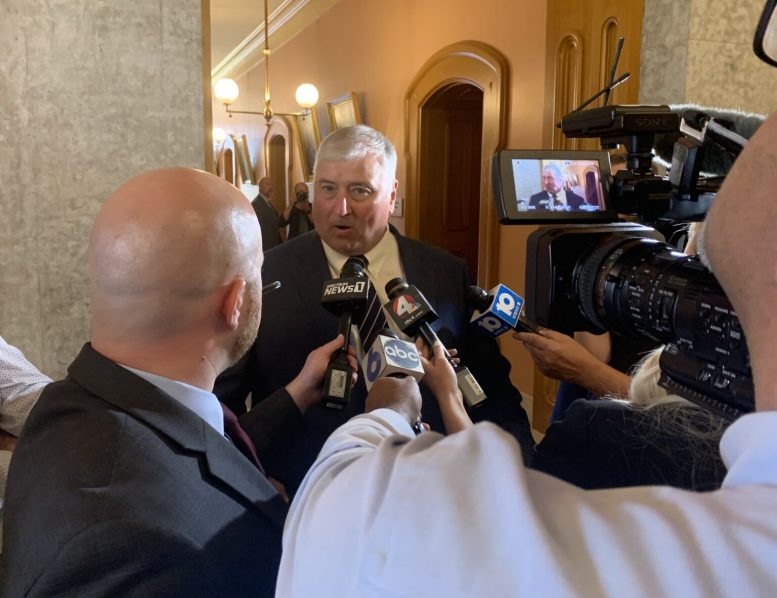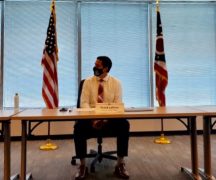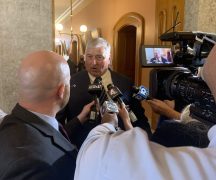This update on Ohio’s ongoing utility corruption scandal and is a joint project of Eye on Ohio, the nonprofit, nonpartisan Ohio Center for Journalism, and the nonprofit Energy News Network. It was originally published by Energy News Network.
Concerns about corruption factor into multiple races as early voting is underway in Ohio. Other developments in the saga surrounding House Bill 6, Ohio’s nuclear and coal bailout law, include:
- Ohio’s highest court may soon rule on whether the Office of the Ohio Attorney General can continue to restrict assets of former utility regulator Sam Randazzo until a civil corruption case against him and others wraps up.
- The Public Utilities Commission of Ohio continues to delay action in coal plant bailout and FirstEnergy cases, as well as public records requests.
- Disputes continue in shareholder cases related to FirstEnergy’s alleged actions on HB 6.
Voting begins
Early voting is underway in Ohio, where corruption remains an issue in various races.
Incumbent Republican Attorney General Dave Yost has defended his record in the civil litigation on HB 6. Jeff Crossman, the Democratic challenger, said he would take a more aggressive stance, saying that Yost hasn’t issued subpoenas or done a thorough investigation of possible charges.
In the governor’s race, Republican incumbent Mike DeWine has so far refused to appear in debates or candidate forums with Democratic challenger Nan Whaley. She now calls for firing the PUCO commissioners and making other reforms.
Various legislators who voted for HB 6 are also up for reelection. (That includes District 75 Rep. Haraz Ghanbari.) Delays in ongoing federal and state proceedings have kept full information about the scandal from the public. And while a federal court imposed the current district maps because of timing issues, the Ohio Supreme Court has held they were unconstitutional gerrymanders, which reduces accountability to voters.
“Columbus has been filled with this culture of corruption for longer than I’ve been alive,” said state House candidate Sam Lawrence, a Democrat from Oxford, during an Oct. 13 debate. His opponent, incumbent Republican Sara Carruthers of Hamilton, wasn’t among the “Team Householder” group known to have gotten money from him in 2018. But she voted for HB 6 in 2019 and against oustingformer House Speaker Larry Householder in 2021.
Judicial candidates generally don’t take a position on policy matters that could come before them in court. Yet winners of the three races for Ohio Supreme Court seats may well rule on cases involving HB 6 and other energy issues. Republican incumbents Patrick DeWine and Patrick Fischer are challenged by Democrats Marilyn Zayas and Terri Jamison, while sitting justices Sharon Kennedy, a Republican, and Jennifer Brunner, a Democrat, vie for Chief Justice.
Read more:
- Ohio Election 2022: Dave Yost and Jeff Crossman run for Ohio Attorney General (WYSO)
- Democrat Nan Whaley: Much of agenda as governor would have to wait until another redistricting plan passes (Cleveland.com)
- Six key energy questions that winners of Ohio’s high court races will decide (Energy News Network/Eye on Ohio)
- 47th House District: Incumbent Sara Carruthers faces Dem challenger Sam Lawrence (Journal-News)
Campaign contributions continue
As of Oct. 21, reports for FirstEnergy’s political action committee to the Federal Election Commission and Secretary of State did not show spending to support Ohio candidates this year. AEP’s political action committee reported donations to multiple Ohio candidates in September, including House Majority Floor Leader Bill Seitz, who was at the forefront of key points in HB 6.
AEP and its political action committee also gave $350,000 and Duke Energy’s committee gave $180,000 to the Republican Governors Association during this election cycle, tracking by the Energy and Policy Institute shows. Dominion gave $510,000 through Sept. 30.
The RGA’s campaign arm spent roughly $570,000 through August on an ad campaign attacking Whaley. Earlier this year, the RGA gave more than $2 million to groups that ran ads supporting DeWine.
Read more:
- Big Ohio donors to GOP group behind Nan Whaley attack ad include DeWine appointees, state contractors (Cleveland.com)
Randazzo’s asset redux?
The Supreme Court of Ohio could soon rule on the Ohio attorney general’s effort to keep millions of dollars’ worth of Sam Randazzo’s assets frozen. FirstEnergy disclosed in November 2020 that it had paid $4.3 million to one of Randazzo’s companies shortly before DeWine appointed him chair of the PUCO. In July 2021, FirstEnergy admitted the money was meant as a bribe.
The attorney general then added Randazzo as a defendant to its civil racketeering case and got the trial court’s go-ahead to freeze some of his assets as security for any judgment in the case. Although the state stopped short of seizing cars, including a pink 2002 Porsche, it restricted various financial accounts. Affidavits related to real estate also were filed, said spokesperson Bethany McCorkle at the attorney general’s office.
Randazzo has denied liability and appealed the rulings allowing the attachments. The appellate court decided the trial court had erred in finding that the state would suffer “irreparable injury” if it couldn’t restrict Randazzo’s property. If the Court of Appeals’ decision is not stayed, the restrictions would be released, according to attorney Roger Sugarman, who represents Randazzo.
Yost’s filings note that Randazzo has already transferred a property he owns to his son for free and moved $3 million to his law firms.
On Oct. 17, the appellate court refused to issue a stay. But the next day, the Ohio attorney general’s office filed a notice of appeal with the Ohio Supreme Court and asked it to keep the restrictions in place until the case is decided.
If the restrictions are lifted, “Randazzo will no doubt continue to transfer property (rightfully owed to Ohioans for his part in the conspiracy) beyond the reach of the State and outside the jurisdiction of this Court,” the attorney general’s office wrote in an Oct. 18 filing.
The Ohio Supreme Court has discretion over whether to accept the case. It’s unclear whether any of the justices will recuse themselves, or step back from the case. In the past, Justices Pat DeWine, Sharon Kennedy and Pat Fischer have received campaign donations from FirstEnergy, according to data from Open Secrets’ FollowTheMoney.org.
Read more:
- Ohio Attorney General Dave Yost asks Ohio Supreme Court to keep former utility regulator’s assets frozen (Cleveland.com)
- Ex-PUCO Chair Sam Randazzo scores legal win as appeals court overturns order to seize $8 million in assets (Cleveland.com)
- Judge orders unfreezing of assets for Sam Randazzo, former Ohio regulator accused of taking bribe in FirstEnergy scandal (WKYC)
Coal plant cases drag on
Ratepayers could be owed millions of dollars if regulators or the Ohio Supreme Court hold that utilities improperly passed through various costs for two 1950s-era coal plants. The PUCO let some utilities collect the charges before House Bill 6 took effect. Audits would then see if costs were prudently incurred and in ratepayers’ interests. HB 6 wrote the subsidies into law through 2030.
Although some charges date back to 2018, Ohio regulators have taken no action in months in cases dealing with the Ohio Valley Electric Corporation plants in Ohio and Indiana. Ratepayers are getting tiny credits right now because of past overpayments. But the coal plant bailouts have had a net cost to customers of more than $173 million so far. Critics expect costs for the plants will rise in the future.
The PUCO has paused four FirstEnergy cases dealing with HB 6. Cases dealing with the OVEC plants are not bound by that stay.
Read more:
- As Ohio regulators sit on coal plant subsidy cases, costs could rack up for ratepayers (Energy News Network/Eye on Ohio)
- Coal plant subsidies from pay-for-play legislation have cost Ohioans $173 million (Ohio Capital Journal)
Consumers’ counsel seeks thaw from freeze
The Office of the Ohio Consumers’ Counsel has asked the PUCO tonarrow the stay in the FirstEnergy cases. The total freeze goes beyond a federal prosecutor’s request to hold off on questioning witnesses under oath, it argued.
The consumers’ counsel also struck back against FirstEnergy’s gambit to block it from producing documents in response to public records requests. Among other things, the PUCO lacks jurisdiction over how the consumers’ counsel handles public records requests, the consumer protection agency argued. Also, it argued, a court would be the proper forum for any disputes under the relevant confidentiality agreement between the agency and FirstEnergy, not the PUCO.
FirstEnergy also hasn’t met its burden of showing the documents are confidential, the consumers’ counsel argued. The materials, sought by Energy News Network and Eye on Ohio, were exhibits when FirstEnergy’s assistant controller Tracy Ashton was questioned under oath in shareholder lawsuits.
FirstEnergy did agree to the release of three documents, including a 2019 text exchange between former FirstEnergy CEO Chuck Jones and Randazzo, congratulating him on his appointment to the PUCO.
Read more:
- FirstEnergy fights to keep records tied to bribery scheme from the public (Ohio Capital Journal)
Still seeking documents
The PUCO released another batch of documents in late September, which had been among those subpoenaed by federal authorities last year. The materials include more documents showing that Randazzo and others took an active role in defending HB 6 against its repeal following the arrest of former House Speaker Larry Householder in July 2020.
Among other things, Randazzo had staff compile data for his testimony to lawmakers in September 2020, when he stressed complications involved in a proposed repeal of HB 6. The data presented only the costs of the energy efficiency standards, and not their overall economic and health benefits, or long-term environmental impacts. And Randazzo urged staff to provide only aggregate numbers, instead of utility-specific data that would show how much companies profited from “shared savings” under the rules.
Shortly afterward, Rep. Bill Seitz praised Randazzo’s remarks as “excellent, excellent testimony.”
“The PUCO has been much more forthright under Chairman Randazzo than under previous chairmen,” Seitz added. “Because the previous governor [John Kasich] muzzled the PUCO and would not let the PUCO provide the kind of input that we used to get way back in the day.”
The PUCO still has not provided all the outstanding documents sought in public records requests, including materials sought by Energy News Network and Eye on Ohio for the period after Randazzo left the PUCO. The Office of the Ohio Attorney General has retained Seitz’s law firm, Dinsmore, to work with the PUCO on that and other document requests.
Read more:
- Special counsel hired to help Ohio regulators with document requests has multiple ties to HB 6 push (Eye on Ohio/Energy News Network)
No ‘free pass’
The departure of FirstEnergy CEO Steven Strah at the completion of an internal review shows the corporate governance reforms are working, said an Oct. 11 filing by shareholders settling derivative claims related to HB 6. Derivative claims are brought on behalf of a corporation and seek to recover for harm allegedly done by officers and directors.
An objecting shareholder argued last month that the settlement basically gave Strah a “free pass,” by letting him retire, keep past incentives, and not have to pay damages to FirstEnergy.
FirstEnergy hasn’t made the results of the internal review public and may face questions about it during its Oct. 26 earnings call, said Dave Anderson, policy and communications manager for the Energy and Policy Institute.
Meanwhile, litigation continues in cases brought by shareholders who incurred losses on FirstEnergy stock sales. Among other things, former FirstEnergy CEO Chuck Jones is seeking documents from Randazzo’s old law firm dealing with Industrial Energy Users-Ohio, for which he served as general counsel.
Despite ordering an audit last December to look into a 2015 settlement where IEU-Ohio withdrew opposition to FirstEnergy bailouts, the PUCO renewed the organization’s power aggregator license on Oct. 7. The case docket does not reflect any questioning by the PUCO about the relationships over the years between the organization, Randazzo and FirstEnergy.





